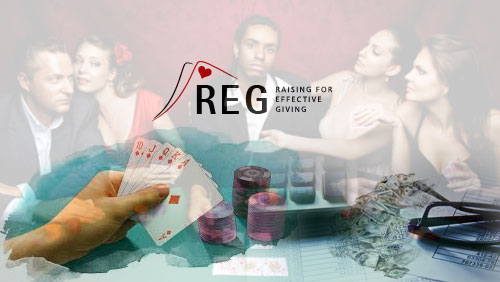Effective altruist, Louie Helm, delves into the research to understand the deeper effects that poker has on society, and covers his findings in a three-part series on the Raising for Effective Giving blog.
 There are times in your life when the whole world passes you by like a cloud in the sky. You wake up, brush your teeth, wash your face, head to work, do your thing, come home, have a bath, and sit down in front of the idiot box for your night of entertainment before doing it all again.
There are times in your life when the whole world passes you by like a cloud in the sky. You wake up, brush your teeth, wash your face, head to work, do your thing, come home, have a bath, and sit down in front of the idiot box for your night of entertainment before doing it all again.
At times like these you aren’t really thinking. You’re on autopilot. You have a sense of what society demands of you. It has been hammered into your brain by your parents, schoolteachers and now your boss. The idea of whether you are having a positive effect on society never floats into your mind. It’s up there with that cloud I spoke about.
I have found that as I age, my impact on society becomes more important to me. I guess you could say that I have woken up. I’m not sure what the trigger was. Is it mortality creeping up on me? The need to make an impact before I leave this world, or to squeeze in everything that’s important to me in the time remaining?
I don’t know.
But I am certainly thinking about it.
Another group that has their cogs whirring are Raising for Effective Giving (REG). The group, fronted by Liv Boeree, Philipp Gruissem and Igor Kurganov has been in the press a lot of late. Martin Jacobson donated $250,000 of his $10 million World Series of Poker (WSOP) winnings to the non-profit, and they were honored at the 2014 Global Poker Index (GPI) European Poker Awards (EPA) for their contributions to charity.
You could say that REG was born after one young man also started to think about the impact he was having on society. His name was Philip Gruissem and he was earning millions playing cards. Was that contributing to society? That question led to the creation of REG, and effective altruist Louie Helm is ready to delve a little deeper into that question in a three-part series that looks at ‘The Effects of Poker on Society’.
In Part I, Helm does some research on the economic impact that poker has on the world. He uncovers some interesting statistics that I am sure they won’t mind me ripping straight from their blog post.
Poker’s annual worldwide economic impact is as follows:
- $5.16 billion in economic impact
- 108,240 jobs created directly and indirectly from live poker
- $1.25 billion in direct and indirect tax revenue from live poker
- 11,660 jobs created directly and indirectly from online poker
- $47 million in direct and indirect tax revenue from online poker
Helm notes that these figures are ‘relatively conservative estimates’. You can learn more about his data by reading his blog post in full right here.
So if you do wake up from your multi-table zombie like stupor asking the question, “is this all worth it?” Then it looks like the answer might be yes, if you are happy to make a positive economic impact on the world.
Me?
I want much more than that.
But, it’s certainly a start.